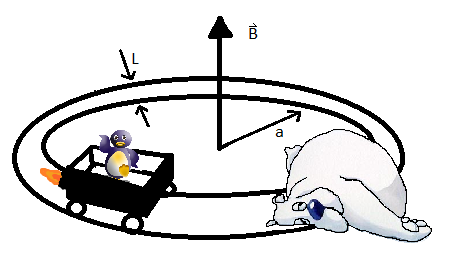Example: Metal Cart: Difference between revisions
Amy.crosby (talk | contribs) No edit summary |
Amy.crosby (talk | contribs) No edit summary |
||
| Line 14: | Line 14: | ||
We have two forces, <math> F_1 </math> being the force from the rocket engine and <math> F_2 </math> being the force caused by the current in the conductor and the Magnetic Field. |
We have two forces, <math> F_1 </math> being the force from the rocket engine and <math> F_2 </math> being the force caused by the current in the conductor and the Magnetic Field. |
||
The resulting Force <math> F_t </math> is simply the sum of <math> F_1 </math> and <math> F_2 </math> |
The resulting Force <math> F_t </math> is simply the sum of <math> F_1 </math> and <math> F_2 </math> |
||
<math> F_2 </math> can be found using Ampere's Law |
|||
<math>\vec F=\int\limits_{c} I ~\vec dl\times \vec B~~~~~\to~~~~~ \vec F=\int\limits_{0}^{L} I ~\vec dl\times \vec B ~~~~~\to~~~~~ \vec F=- I(t) ~B~L ~~ \hat i</math> |
|||
We can also say that <math> I(t)=\frac{-e_m(t)}{R} </math> |
|||
Revision as of 18:54, 25 January 2010
Problem
A DC generator is built using a metal cart with metallic wheels that travel around a set of perfectly conducting rails in a large circle. The rails are L m apart and there is a uniform magnetic field normal to the plane as shown in Figure 1. The cart has a mass m and is driven by a rocket engine having a constant thrust . A wet polar bear, having stumbled out of a shack where he recently had a bad experience with a battery, lays dead across the tracks acting as if a resistor R is connected as a load. Find The current as a function of time. What is the current after the generator attains the steady-state condition?
Solution
For this Problem we will represent the large circle as a pair of straight parallel wires and the cart as a single wire. This is illustrated below
FIGURE
We have two forces, being the force from the rocket engine and being the force caused by the current in the conductor and the Magnetic Field. The resulting Force is simply the sum of and
can be found using Ampere's Law
We can also say that






